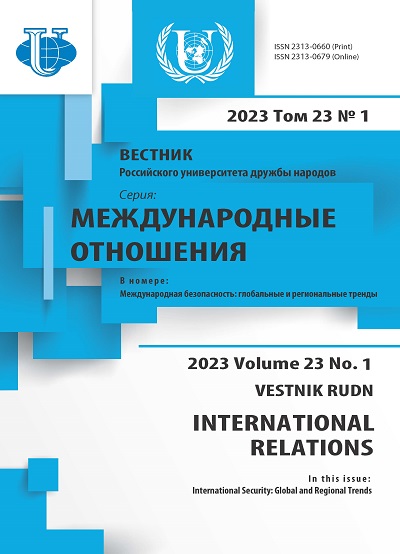Modeling the Country’s Participation in Armed Conflict Resolution: Case of Germany’s Activity in Mali
- 作者: Trunov P.O.1
-
隶属关系:
- Institute of Scientific Information for Social Sciences, Russian Academy of Sciences
- 期: 卷 23, 编号 1 (2023): International Security: Global and Regional Trends
- 页面: 48-66
- 栏目: THEMATIC DOSSIER
- URL: https://journals.rudn.ru/international-relations/article/view/34191
- DOI: https://doi.org/10.22363/2313-0660-2023-23-1-48-66
- EDN: https://elibrary.ru/VAAHWL
如何引用文章
详细
In the early 2020s, the challenges of maintaining a Western presence in the zones of armed conflicts in Asia and Africa increased dramatically. This was most evident in Afghanistan, while notable difficulties were also observed in the Sahara-Sahel region. In trying to understand the reasons for this, the author turned to the situation in Mali, trying to correlate the Germany’s actions in Mali with the author’s theoretical-practical scheme of participation of an outside actor in the resolution of an armed conflict. Reaching the position of a full-fledged global actor, Germany is especially interested in creating a strategic presence in the instability zones and is sensitive to its loss. At the first stage of the resolution, the key tasks are the bracketing of radical forces, especially terrorist groups, and the reconciliation of the moderate ones, which are interested in preserving the institution of the state as such. The second stage is the time for full-scale international peacekeeping. The third stage is the nationalization of the resolution, i.e. the transfer of control over the process to the authorities and security forces in the country of conflict’s origin. The study explores the forms, scale, and geographical features of Germany’s use of military tools and diplomatic capabilities in the first two stages of the 2013-2019 resolution. The main “bottlenecks” of the approach are identified, including the persistent delay in applying sufficient efforts and the determinism of this trend. For 2020-2021, two contradictory paths are shown against the background of a new wave of activation of terrorist groups in the south of Mali: an accelerated transition to nationalization with a possible withdrawal of German and French support, and a postponement of the third stage, linked to the preparations for the continued presence of Western countries in Mali.
作者简介
Philipp Trunov
Institute of Scientific Information for Social Sciences, Russian Academy of Sciences
编辑信件的主要联系方式.
Email: 1trunov@mail.ru
ORCID iD: 0000-0001-7092-4864
PhD (Political Sciences), Senior Research Fellow, Department of Europe and America
Moscow, Russian Federation参考
- Barthel, D. (2011). Die neue Sicherheitsund Verteidigungsarchitektur der Afrikanischen Union: Eine völkerrechtliche Untersuchung. Heidelberg: Springer. https://doi.org/10.1007/978-3-642-20034-2
- Chernega, V. N. (2022). Assertive policy of France in Syria and Libya. Current Problems of Europe, (4), 109-133. (In Russian). https://doi.org/10.31249/ape/2022.04.05
- Filippov, V. R. (2021). Azawad as a self-proclaimed Tuareg state. Outlines of Global Transformations: Politics, Economics, Law, 14(1), 214-227. (In Russian). https://doi.org/10.23932/2542-0240-2021-14-1-11
- Filippov, V. R. (2022). Operation “Barkhan”: An inglorious end? Asia and Africa Today, (1), 40-47. (In Russian). https://doi.org/10.31857/S032150750018297-8
- Glatz, R. L., & Kaim, M. (2020). Mandat verlängern - Abzug vorbereiten. SWP-Aktuell, (18), 1-4. https://doi.org/10.18449/2020A18
- Hanish, M. (2015). A new quality of engagement Germany’s extended military operation in northern Mali. Bundesakademie für Sicherheitspolitik. Security Policy Working Paper, (8), 1-5. Retrieved from https://www.baks.bund.de/en/working-papers/2015/mali-a-new-quality-of-engagement
- Klute, G. (2013). Tuareg-Aufstand in der Wüste. Ein Beitrag zur Anthropologie des Krieges und der Gewalt. Mit einem Geleitwort von Trutz von Trotha. Köln: Rüdiger Köppe Verlag.
- Lacher, W. (2021). Unser schwieriger Partner. Deutschlands und Frankreichs erfolgoses Engagement in Libyen und Mali. Berlin: Stiftung Wissenschaft und Politik. https://doi.org/10.18449/2021S03
- Lacher, W., & Tull, D. M. (2013). Mali: Beyond counterterrorism. SWP-Comment, (7), 1-7. Retrieved from https://www.swp-berlin.org/en/publication/mali-beyond-counterterrorism
- Lukas, S., & Paradies, M. (2019). Ein schwieriger Wiederaufbau. Perspektiven europäischer Initiativen in Syrien. Bundesakademie für Sicherheitspolitik. Arbeitspapier Sicherheitspolitik, (2), 1-4. Retrieved from https://www.baks.bund.de/en/node/1609
- Major, C., Schulz, R., & Vogel, D. (2020). Die neuartige Rolle der Bundeswehr im Corona-Krisenmanagement. SWP-Aktuell, (51), 1-8. https://doi.org/10.18449/2020A51
- Mezentsev, S. V. (2014). Domestic and international political aspects of crisis in Mali and French military operation ‘Serval’. Moscow University Bulletin of World Politics, (1), 3-28. (In Russian).
- Müller, M., & Vorrath, J. (2021). Between war and peace: How to raise Germany’s profile in crisis prevention in Sub-Saharan Africa. In G. Maihold, S. Mair, M. Müller, J. Vorrath & C. Wagner (Eds.), German foreign policy in transition (pp. 87-90). Berlin: SWP.
- Sidorov, A. S. (2018). France in the Sahel: The ongoing problems and possible spread of military conflict. Current Problems of Europe, (4), 116-137. (In Russian).
- Sidorov, A. S. (2021). Strategic impasse in the Sahel: From meeting in Po to meeting in N’Djamena. Evropejskaja Bezopasnost’: Sobytija, Ocenki, Prognozy, (62), 22-27. (In Russian).
- Stanzel, A. (2021). Chinas Weg zur Geopolitik. SWP-Studie, (26), 1-39. https://doi.org/10.18449/2021S26
- Transfeld, М. (2022). Three scenarios for the Yemen war. SWP-Comment, (6), 1-6. https://doi.org/10.18449/2022C06
- Trunov, Ph. O. (2018). Germany’s policy on the settlement of armed conflicts. Moscow: Kuchkovo Pole publ. (In Russian).
- Tull, D. M. (2017). Mali und G5: Ertüchtigung des Sicherheitssektors, SWP-Aktuell, (76), 1-4. Retrieved from https://www.swp-berlin.org/publikation/mali-und-g5-ertuechtigung-des-sicherheitssektors
- Tull, D. M. (2019). UN peacekeeping in Mali. SWP-Comment, (23), 1-4. https://doi.org/10.18449/2019C23
- Tull, D. M. (2021). Operation Barkhane im Sahel. SWP-Aktuell, (6), 1-4. https://doi.org/10.18449/2021A06
- Von Krause, U. (2019). Die Bundeswehr als Teil einer Europäischen Armee. Realistische Perspektive oder unrealistische Vision? Bundesakademie für Sicherheitspolitik. Arbeitspapier Sicherheitspolitik, (18), 1-5. Retrieved from https://www.baks.bund.de/de/arbeitspapiere/2019/die-bundeswehr-als-teil-einer-europaeischen-armee-realistische-perspektive-oder#:~:text=Dabei%20kommt%20es%20zu%20dem,kompatible%20rechtliche%20Bestimmungen%20%E2%80%93%20unrealistisch%20ist








